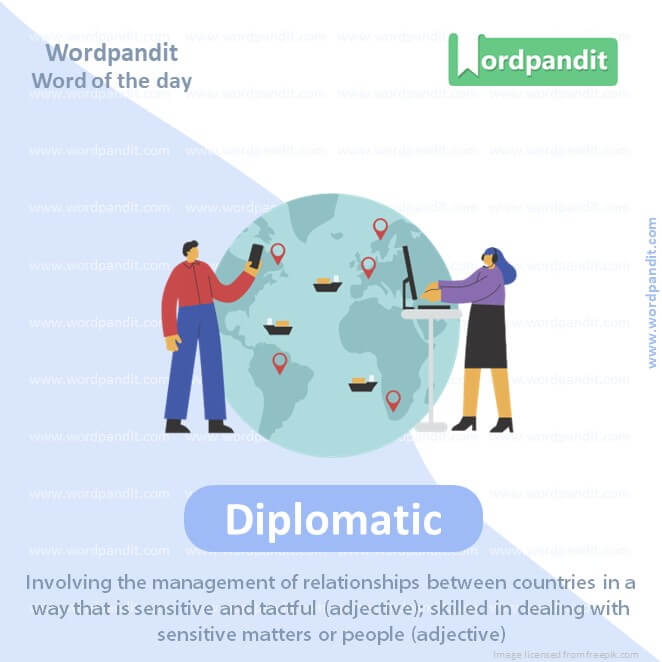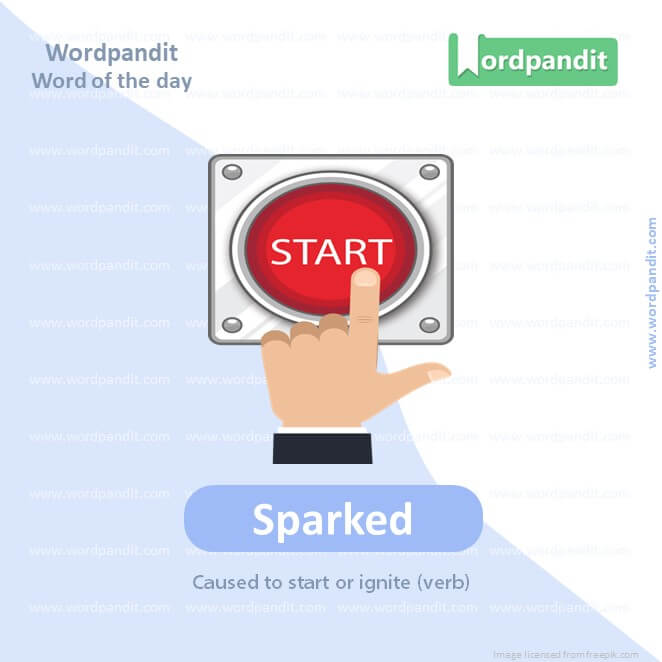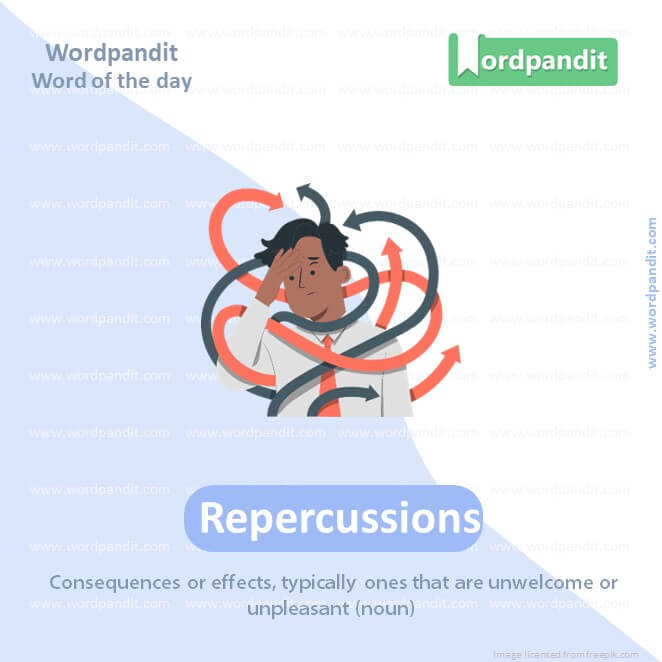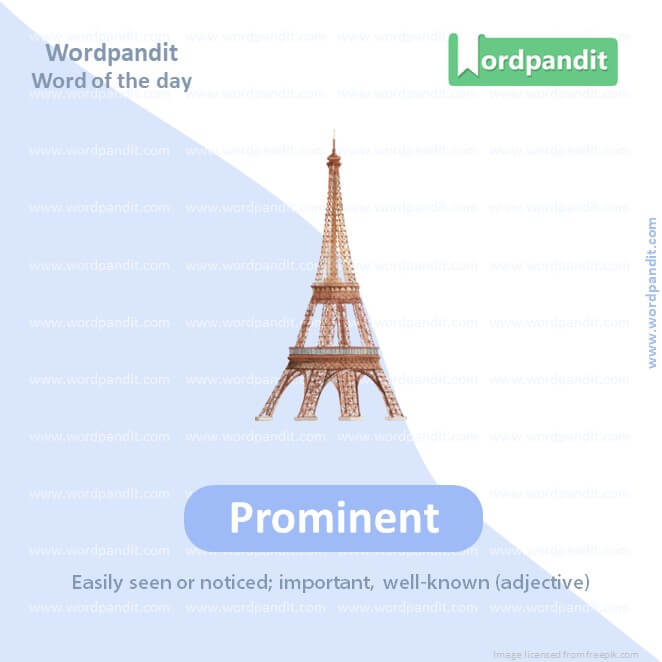Daily Vocabulary Words: List of Daily Used Words
Hi there. Welcome to this special section @ Wordpandit.
Our endeavour here is straightforward: highlighting important daily vocabulary words, you would encounter in The Hindu. This is your repository of commonly used words; essentially, we are posting a list of daily used words. Hence, this has significant practical application as it teaches you words that are commonly used in a leading publication such as The Hindu.
Visit the website daily to learn words from The Hindu.

WORD-1: Diplomatic
CONTEXT: The Chinese make up for the minor reduction in Indian tourists in the Maldives following the diplomatic row between New Delhi and Malé.
SOURCE: The Hindu
EXPLANATORY PARAGRAPH: Imagine you have two friends who are upset with each other, and you help them calm down and make up without choosing sides. Being diplomatic is like being that friend who is really good at solving problems without making anyone mad. You talk nicely, listen to everyone, and find a way to make everyone happy.
MEANING: Involving the management of relationships between countries in a way that is sensitive and tactful (adjective); skilled in dealing with sensitive matters or people (adjective).
PRONUNCIATION: dip-luh-MAT-ik
SYNONYMS: Tactful, Sensitive, Polite, Courteous, Strategic, Conciliatory, Mediator-like
USAGE EXAMPLES:
1. She had a diplomatic way of handling the disagreement between her two colleagues.
2. The ambassador’s diplomatic efforts helped avoid a conflict.
3. He was known for his diplomatic approach to problem-solving.
4. They sent a diplomatic envoy to discuss the terms of peace.

WORD-2: Sparked
CONTEXT: The tweets sparked a call by some Indians on social media to boycott the Maldives. This was an attempt by them to puncture the biggest money-maker for the Maldives, the tourism industry. Meanwhile, Maldivian President Mohamed Muizzu strengthened ties with one of India’s rivals, China.
SOURCE: The Hindu
EXPLANATORY PARAGRAPH: Imagine you’re playing with a toy that lights up when you press a button. Pressing that button starts the light, just like sparking something starts it too. When someone says something sparked, it means something started or caused something else to start, like a story or a big event, just like how pressing the button starts the light.
MEANING: Caused to start or ignite (verb).
PRONUNCIATION: sparkd
SYNONYMS: Ignited, Triggered, Initiated, Caused, Induced, Provoked, Stimulated
USAGE EXAMPLES:
1. The new invention sparked a lot of interest.
2. Her comment sparked a debate in the classroom.
3. The historical event sparked a change in laws.
4. A small incident sparked a big argument.

WORD-3: Marginally
CONTEXT: While the number of Indian tourists visiting the Maldives has declined marginally, Chinese tourists have swiftly filled this gap, resulting in an overall increase in tourist inflows, data show.
SOURCE: The Hindu
EXPLANATORY PARAGRAPH: Imagine you have a picture, and you draw a tiny line around the edge; you’ve only changed the picture a little bit, right? Marginally means something similar—it’s when something changes just a tiny, tiny bit, almost like it’s barely noticeable.
MEANING: Slightly or to a small extent (adverb).
PRONUNCIATION: MAR-juh-nuhl-ee
SYNONYMS: Slightly, Minimally, Barely, Just, Narrowly, Little, Scarcely
USAGE EXAMPLES:
1. Her grades improved marginally after she started studying more.
2. The new policy had only marginally affected the issue.
3. He was marginally better at the game than his sister.
4. The cost was marginally higher than expected.

WORD-4: Repercussions
CONTEXT: It is important to note that the decline cannot be entirely attributed to the boycott call as a considerable share may also have dropped their plans fearing repercussions of the ongoing row, among other reasons.
SOURCE: The Hindu
EXPLANATORY PARAGRAPH: Think about when you drop a stone in a pond, and you see the water ripple outwards. Repercussions are like those ripples, but instead of water, they are the things that happen because of something else you did. Like if you don’t do your homework, a repercussion might be getting a time-out.
MEANING: Consequences or effects, typically ones that are unwelcome or unpleasant (noun).
PRONUNCIATION: ree-per-KUH-shuhns
SYNONYMS: Consequences, Effects, Outcomes, Results, Impacts, Aftermath, Fallout
USAGE EXAMPLES:
1. The decision had serious repercussions for the company.
2. She didn’t realize the repercussions of her actions until it was too late.
3. The event’s repercussions were felt throughout the community.
4. He considered the possible repercussions before making a choice.
WORD-5: Entirely
CONTEXT: This increase is entirely due to the sudden surge in the number of Chinese tourists from just 6,563 to 25,303 in the period.
SOURCE: The Hindu
EXPLANATORY PARAGRAPH: Imagine you have a box of crayons, and you use every single one to color a picture. If you use all the crayons, you’ve colored the picture entirely. Entirely means using all of something or being completely something, like when you’re entirely happy, there’s no sadness at all.
MEANING: Completely or fully, with nothing left out (adverb).
PRONUNCIATION: en-TYRE-lee
SYNONYMS: Completely, Fully, Totally, Wholly, Absolutely, Thoroughly, Altogether
USAGE EXAMPLES:
1. She was entirely convinced by his argument.
2. The movie was entirely different from the book.
3. He was entirely responsible for the success of the project.
4. The room was painted entirely in blue.
WORD-6: Diminish
CONTEXT: On January 13, Mr. Muizzu announced that the government’s health insurance scheme will cover visits to the UAE and Thailand too, to “diminish reliance on a select group of countries”.
SOURCE: The Hindu
EXPLANATORY PARAGRAPH: Think about when you eat a big chocolate bar. Each bite makes the chocolate bar smaller and smaller. Diminish is like that; it means to make something less or smaller, like when the number of candies you have gets smaller because you’re eating them.
MEANING: Make or become less (verb).
PRONUNCIATION: di-MIN-ish
SYNONYMS: Reduce, Decrease, Lessen, Lower, Minimize, Shrink, Dwindle
USAGE EXAMPLES:
1. The noise diminished as we moved away from the festival.
2. Her patience diminished after waiting for hours.
3. The company’s profits have diminished this year.
4. He hoped the medication would diminish the pain.
WORD-7: Monitoring
CONTEXT: The Uniform Civil Code (UCC) passed in Uttarakhand on Wednesday, which requires consenting adults who intend to enter a live-in relationship to submit a “joint statement” to that effect before a “Registrar”, dares individuals’ freedom to form “intimate associations” without state monitoring or regulation.
SOURCE: The Hindu
EXPLANATORY PARAGRAPH: Imagine you have a pet hamster, and you keep checking if it has enough food, water, and if it’s playing happily. Monitoring is just like that—watching and checking on something carefully over a period of time to make sure everything is okay.
MEANING: Observing and checking the progress or quality of (something) over a period of time; keeping under systematic review (verb).
PRONUNCIATION: MON-i-tor-ing
SYNONYMS: Observing, Checking, Tracking, Watching, Surveying, Supervising, Scrutinizing
USAGE EXAMPLES:
1. They are monitoring the patient’s condition closely.
2. The teacher is monitoring the students’ progress.
3. Environmental scientists are monitoring the air quality.
4. The software is used for monitoring network security.
WORD-8: Prospective
CONTEXT: Section 381 of Uttarakhand’s common civil code empowers the Registrar to examine the statement submitted by prospective live-in partners, conduct an “enquiry” to check if the relationship between the couple is not a “prohibited” one and even summon them.
SOURCE: The Hindu
EXPLANATORY PARAGRAPH: Imagine you’re looking forward to your birthday because you’re excited about the gifts you might get. Prospective is a fancy way of talking about something that is going to happen or something you’re looking forward to in the future, like your birthday party or becoming a big sibling.
MEANING: Expected or expecting to be something in the future (adjective).
PRONUNCIATION: pro-SPEK-tiv
SYNONYMS: Potential, Future, Possible, Likely, Forthcoming, Anticipated, Expected
USAGE EXAMPLES:
1. They were shown around the house by the prospective buyers.
2. She discussed her plans with her prospective employer.
3. The prospective benefits of the project are huge.
4. They are prospective members of the sports club.
WORD-9: Otiose
CONTEXT: “The freedom to choose a partner and the freedom to enjoy their society, which are essential components of the right to enter into a union [and the freedom of intimate association], would be rendered otiose if the relationship were to be discriminated against,” Chief Justice Chandrachud wrote.
SOURCE: The Hindu
EXPLANATORY PARAGRAPH: Imagine you have a toy that doesn’t do anything; it just sits there and isn’t fun to play with. Otiose is a word that means something is not useful or has no purpose, kind of like that boring toy.
MEANING: Serving no practical purpose or result (adjective).
PRONUNCIATION: OH-tee-ose
SYNONYMS: Useless, Pointless, Futile, Ineffective, Redundant, Idle, Unnecessary
USAGE EXAMPLES:
1. The meeting was criticized for being otiose.
2. Many felt the old rule was otiose and needed to be changed.
3. His efforts to solve the problem were rendered otiose.
4. The extra instructions were considered otiose and ignored.

WORD-10: Prominent
CONTEXT: “One of the prominent ideas embraced by the freedom of intimate association is the opportunity it affords to enjoy the society of the other person who is a part of the relationship and the ability to choose to form and maintain such a relationship,” Chief Justice Chandrachud had noted.
SOURCE: The Hindu
EXPLANATORY PARAGRAPH: Think about when you walk into a room and see a big, colorful painting right in front of you; it’s the first thing you notice. Prominent means something that stands out and is very easy to see or know about, like the biggest, most colorful toy in a toy store.
MEANING: Easily seen or noticed; important, well-known (adjective).
PRONUNCIATION: PROM-i-nent
SYNONYMS: Notable, Distinguished, Conspicuous, Leading, Significant, Outstanding, Eminent
USAGE EXAMPLES:
1. She played a prominent role in the political campaign.
2. The monument is a prominent feature of the city skyline.
3. He is a prominent member of the community.
4. The issue has gained prominent attention in the media.
vocabulary correction
Vocabulary correction plays a critical role in enhancing the eloquence of our verbal and written communication. It is necessary to conquer the nuances of a language and get the message across clearly.
Learning vocabulary correction shouldn’t come across as a daunting task laden with an overbearing list of complicated words. In fact, it’s a lifelong journey that evolves continuously with constant learning and usage. So, how exactly does one embark on this journey of vocabulary correction?
Initially, it’s essential to read extensively. Make books, newspapers, blogs and scholarly articles your best friends. They are the potential wellsprings of words waiting to enrich your vocabulary. As you come across unfamiliar words or phrases, have a dictionary and thesaurus handy to comprehend their meanings and usage.
Next, regularly engaging in vocabulary games and quizzes is a fun method of vocabulary correction that shouldn’t be understated. Not only does it expand your knowledge, but it also tests your current vocabulary prowess. Word puzzles, crosswords, and language learning mobile applications offer great platforms for this.
Writing is another powerful tool for effective vocabulary correction. Jotting down thoughts, ideas, or chronicling day-to-day experiences helps us weave words together, enhancing our vocabulary use. You look for the right words to express yourself, and in the process, you learn the correct usage of previously unfamiliar words.
No course of vocabulary correction is complete without active conversation. Engaging in meaningful dialogues introduces us to different styles and manners of speech. We pick up new words and expressions that we may not stumble upon during solitary reading or writing.
Lastly, vocabulary correction involves continuous practice and diligence. Language learning is not a one-and-done deal. It’s a consistent task of engaging, experimenting, and adapting. Remember, vocabulary correction can be monumentally effective education; make sure you learnt it the right way.










